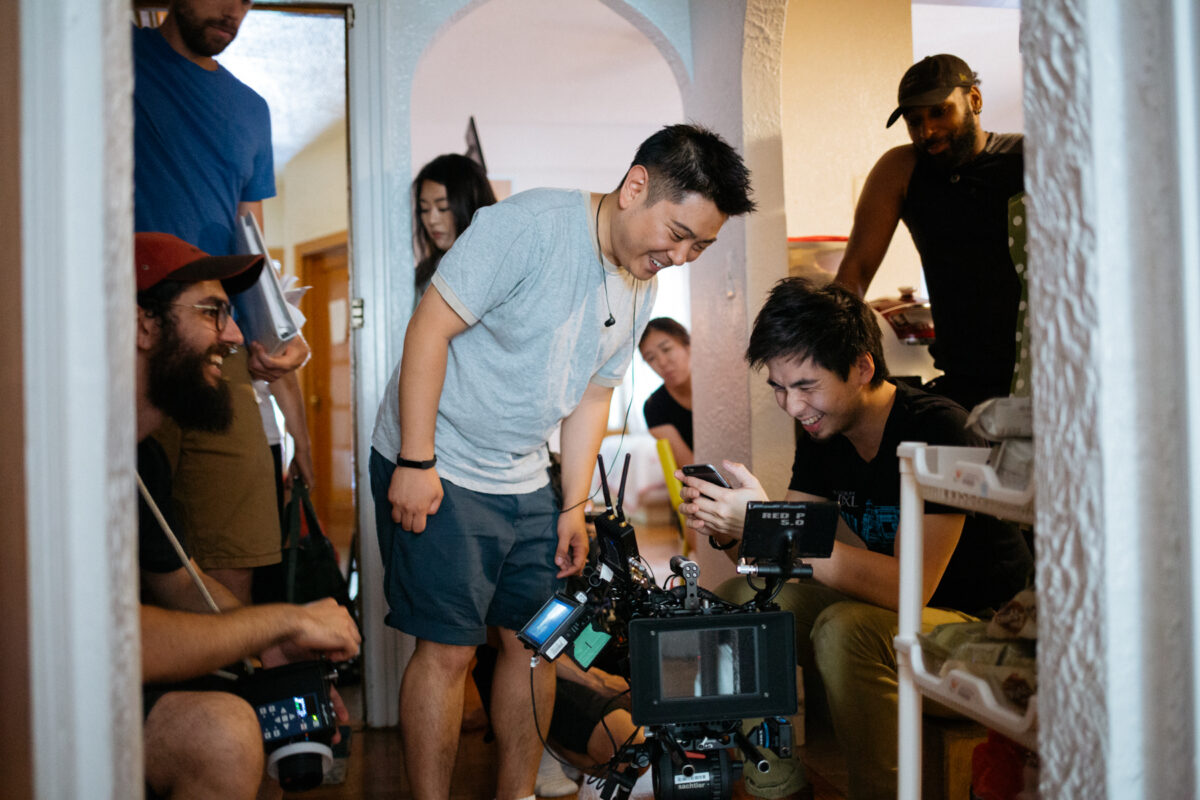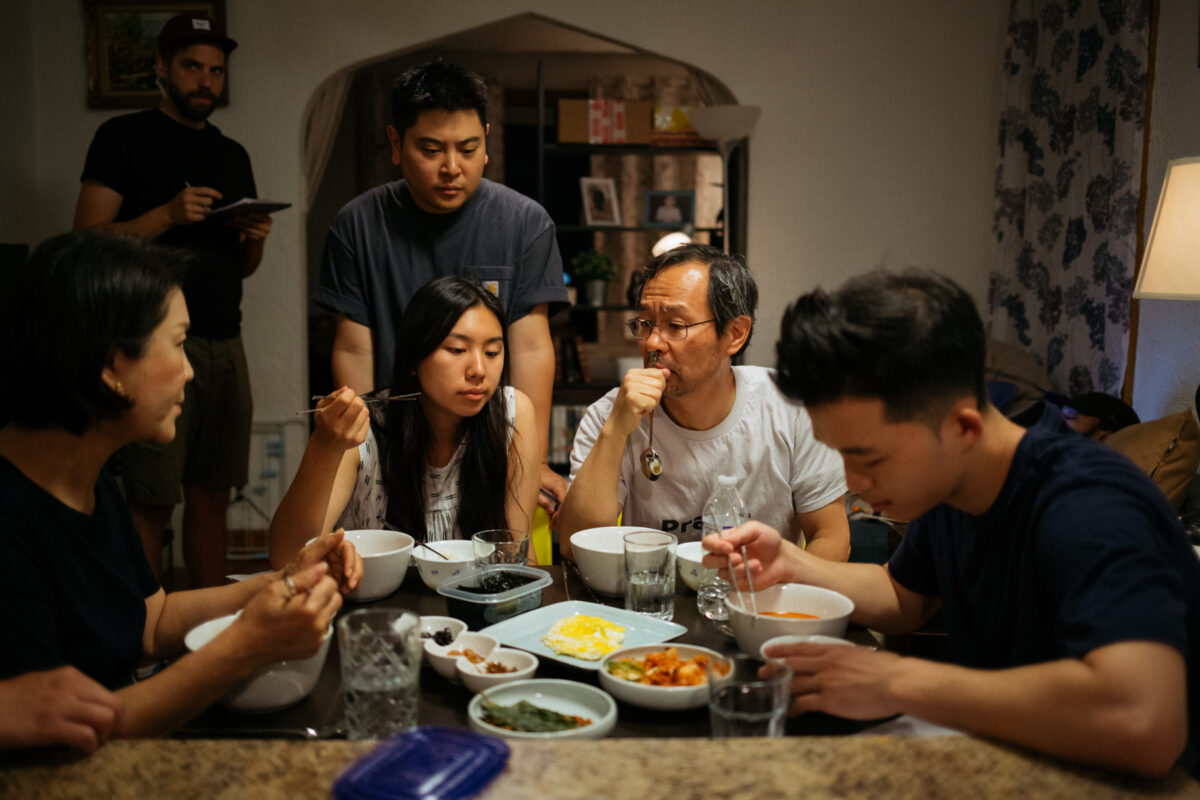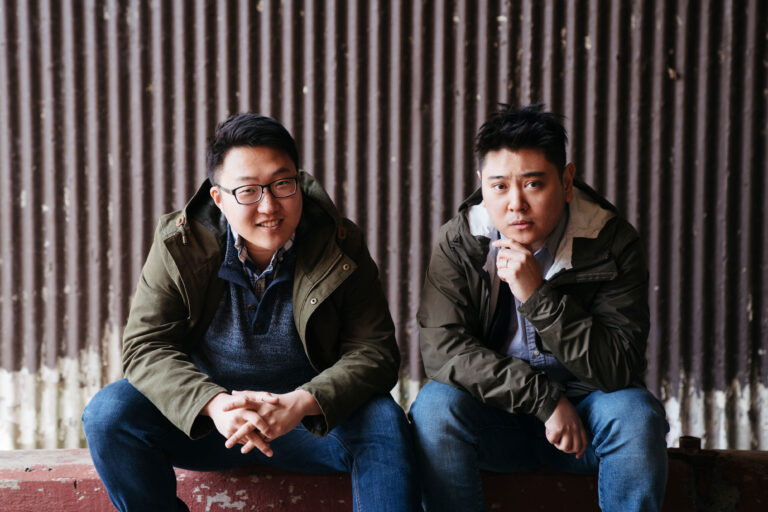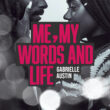A Korean mother is lecturing—no, she’s confessing—on-screen during a pivotal scene in the film Happy Cleaners. The backdrop is ordinary: a dim bedroom and a parent facing the back of a child who flaunts indifference. Both anticipate an argument from the other but the elder speaks softly. She runs down her list of worries as if to herself—from bothersome husbands to untamed sons. It doesn’t, and will never, include the young daughter standing before her. They’re tearful. It’s intense. It’s love.
“We’re telling people to look at our experiences and view our lives for what they’re truly like,” says Korean American indie-filmmaker Julian Kim. “The hope is that it opens up a different perspective for people to view the Asian American and Korean community in a more positive light and see them as human.”
Indeed, the connective tissue that runs through Happy Cleaners, produced and written by Kat Kim, and co-directed by both Julian Kim and Peter S. Lee, who share writing credits, is authenticity. Seen in the shots of Korean cuisine — dumplings, acorn jelly and bulgogi. Heard in the bickering of elders challenging the choices of children growing up in America. Felt when a family of four loses its dry-cleaning business, forcing each member to be vulnerable with one another in order to survive. It’s as much of a conventional tale about an Asian immigrant experience as it is an autobiographical one.
Both Lee and Julian Kim were born and bred in Flushing, New York and both used their hybrid identities to turn a concept into an award-winning film on Amazon, Apple TV and iTunes over the course of two and a half years and with the help of over 300 Kickstarter backers. Simply put, Happy Cleaners is a tale of questions. What does it truly mean to be a minority? And how can you own up to it? In contrast to so much anti-Asian racism and violence – around forever but rising and in the spotlight over the last year – Urbanology chatted with Kim and Lee about these questions and so much more.

We don’t have to necessarily fit into pre-arranged boxes that someone else made for us.
So much of this film tackles the pressures of fitting in as literal or perceived immigrants, and what that can do to a family with different ideas about identity. How did that figure into your own lives growing up in New York?
Peter S. Lee: Happy Cleaners is really a reflection of our reality. I grew up in Flushing, New York, with a particular immigrant experience. I’m sure that (many) can relate to this point, but childhood can be confusing. You’re supposed to behave one way culturally at home and then reset yourself once you’re on the outside. Suddenly, you’re supposed to be this other thing. It’s only when you grow up that you begin to realize that the world is a lot more complicated than that, and you come to understand all those complexities.
For a lot of us, it took a while, but we eventually came to peace with our hybrid identities. We don’t have to necessarily fit into pre-arranged boxes that someone else made for us. For those who share that background, we’re saying that your experiences are totally valid, and you deserve to be seen. For others, it’s giving them a reason for why we’re wired this way, and hopefully, they can share the same humanity with us.
Julian Kim: Peter nailed it. For us, we wanted to figure out who we were when we made this film, and in that way, it was a personal journey of our own. What does it mean to be a minority in America? And how can you own up to it? It should be OK to be proud of the different feelings you experience and there may be a gray area you’re living in that may make up who you are … At the end of the day, what does America really look like? Happy Cleaners is an exploration of all of that which factored into our past.
I loved the way you guys used a cleaning business as a vehicle to show how being othered can affect different personalities. The older generation of Korean immigrants seemed concerned about playing it safe. And the younger generation like the son Kevin would confront others who showed disrespect. What message did you guys want to convey there?
Kim: One message for sure, was that the parents come from a place of pain. They’ve been hurt before. You heard stories here and there of the conflict and confrontations they’ve had, and the unfortunate thing is that they’re always on the losing end of it too. They’re in a place of naturally admitting that they no longer wish for conflict, whereas the younger generation feels as if they’re owed more rights. Kevin is blunt, upfront, but in a way, very naive. When you grow up in this kind of environment, you’re taught by some generations to be careful and that you’re a guest in this country. It’s always a ‘let them win’ kind of thing.
But growing up, you realize that the environment you’ve lived in is the only place and community you’ve known … It’s a common feeling within our communities. But beyond that, we also wanted to acknowledge the pain the first generation had when they first came here. They were pioneers who arrived from nothing and turned into something as entrepreneurs with families they had to raise. There are a lot of scars among them that are both physical and emotional. They deserve credit for that work and sacrifice. We can fight for our rights as a younger generation, but we also must acknowledge the work that went into building the road before us.
A ton of filmmakers I’ve spoken to admit that there’s a need to make sense of their histories in retrospect through their work. When it comes to Happy Cleaners, did you come away with a different understanding of your family experience compared to when you were younger?
Kim: Absolutely. If I’m being honest, I had a big grudge towards my parents. For instance, I’d ask why we were living this way. When I compared myself to my peers, they’d have houses and seemed comfortable versus we who struggled to pay monthly rent and bills. I had no freedom to flex, and I hated the way I was living at the time. Sadly, I despised my parents and life for that reason. It’s ironic in a way … but in (making the film) I got to experience a bit of what it was like to be in my parent’s place. You see those scars and can’t help but feel a bit broken yourself. Working on this film was very therapeutic for the both of us and a complete therapy session. This experience in fact drew me closer to my parents for sure and put me in the position to thank them for everything they’ve done.
Speaking of relationships, how did your family and friends take in the film? I imagine that there must be a different kind of pressure in getting things right when a project is so intimately tied to your community.
Lee: We were so nervous to share this, not just to our immediate family, but to the whole Flushing, Queens community. We’re talking about people we grew up with, and the aunties and uncles we knew. If they were offended or viewed it as inauthentic, then we failed. They had to feel like they were seen, and that fear was very big. Thankfully we received the affirmation we needed and that put us at ease. But on the flip side, there were moments involving close friends who couldn’t immediately give us a reaction. They couldn’t believe that we went there and ripped open Band-Aids. We were forcing our friends to examine the emotions that they may have bottled up for so long. Some needed a few hours or days to give us a call that would later turn into a three-hour unpacking therapy session. But for some of us, it doesn’t exist in the past. This is still a reality that many of us still live in. So, it’s still very raw. In the end, we intended to start a conversation because that’s the beginning point to where healing can happen.
It’s a difficult subject to tackle for your first film. I also appreciated the diverse makeup of the cast and crew. How important was it to be intentional about that going in given how tempting it could be to compromise as an indie film?
Lee: For us, not having any major studio backing gave us the freedom to not compromise. We were able to focus on making everything authentic. The flip side of that comes in the marketing and getting people to support the film overall. But beyond that, we didn’t have to answer to anyone. We were able to answer this mission we set out to accomplish and stay true to our authenticity. To do that, you must provide opportunities. That included our talented cast and crew members who are so often overlooked no matter how gifted they are.

We’re people too and we have families and struggles like everyone else.
I read an interview with the amazing Steven Yeun, where he talks about the catharsis of being able to tell stories that represented his upbringing. He viewed it as special when Asian Americans can take control of their own narratives. How do you guys identify with that sentiment?
Kim: It’s so true. Seeing Asian American faces through stories and content is so encouraging. I never truly knew what that felt like. Being able to watch something like Minari and seeing my life played out in a beautifully cinematic way was so healing. Growing up, we didn’t have much of that content. We had to rely on K-dramas imported from Korea on VHS tapes. You had to watch a lot of these dramas and sitcoms that weren’t necessarily authentic, but instead entertaining. Compared to a film like Minari, you feel something different. It validates who you are. When we hear others come up to us and say that they feel truly represented in the experience, it’s encouraging and shows a need to tell more of these stories.
Speaking of normalizing, what are your views on Korean cinema in general, especially with how it seems to be killing it these days, at least from a distanced perspective?
Lee: It’s exciting that we now have options where we don’t feel like it’s a very one-way type of thing. I think where I draw the line is when we go back to our hybrid identity. When we talk about the K-drama thing, we had to watch that because there was something powerful about seeing someone who looked like you who wasn’t the butt of a joke or someone’s sidekick. Just in your everyday American context, why is there this constant erasure of people of colour? Every time you see a major story about New York it doesn’t have enough POCs. Have you been to New York City? Are there no Asians in California? It almost seems like intentional erasure and that’s painful and traumatic. If you’re exposed to that all your life as a kid, it becomes a damaging thing to your psyche.
You don’t have to answer this if you don’t want to, but over the past few months, there’s been a great deal of anti-Asian sentiment. Much of that was fueled by plain racism, ignorance, and a former U.S. president. What are your thoughts on that, and in the context of being filmmakers, what role do you think filmmaking can have to aid with closing that distance between ignorance and knowing?
Kim: The most unfortunate part is that the people being hurt are the weakest in our communities. Maybe it’s intentional, but they are the ones who are going to be quiet and not report these issues because they aren’t comfortable with the English language and are ashamed. It hurts. It hurts. Especially what happened in Atlanta. I remember feeling shocked when those names came out. They were like my mom, my aunts and my grandma. It should be time for us to overcome all this. At the same time, I think about how it must have felt for other people of colour. I remember being at the front lines of all the George Floyd protests. I saw the unraveling and the rising. I remember being so emotional during the marches, and individuals standing up for Black Lives Matter, and coming to an understanding of what that means.
Going off that, I think storytelling is incredibly important in helping. It’s so that we’re no longer treated like foreigners or some virus-carrying disease. We’re people too and we have families and struggles like everyone else. In stories like Happy Cleaners, we’re telling people to look at our experiences and view our lives for what they’re truly like. The hope is that it opens a different perspective for people to view the Asian American and Korean community in a more positive light and see them as human. We’re not hoping for viewers to be colour blind, but that they appreciate colour and the fact that we live in rainbow countries. We’re simply adding colour to an already beautiful place through story and narrative.
Lee: I do want to bring up that this is nothing new and that this is probably very common when any other oppressed community gets attacked. The media sort of sensationalizes and then treats it differently. It’s unfortunate that it took people to die for it to get this kind of attention. We have a country with a history of committing these attacks on people of colour. It’s heartbreaking when you see an elderly person sitting on their walker waiting for the bus and they’re just attacked. What is going on in that person’s mind? It’s because these attackers don’t see us as human, and that’s the larger messaging. Our hope through film is to show people our honest portrayal of our life. When you watch this, you can see a common humanity and begin to have a conversation. White supremacy created these racial labels that put groups against groups so that those in power could maintain their privileges. It may be Asians today, but who’s going to be next? It’s just hard to process.
Photos Courtesy of KoreanAmericanStory.org.




Comments are closed.